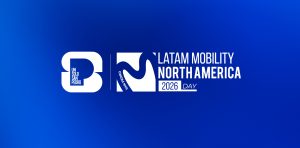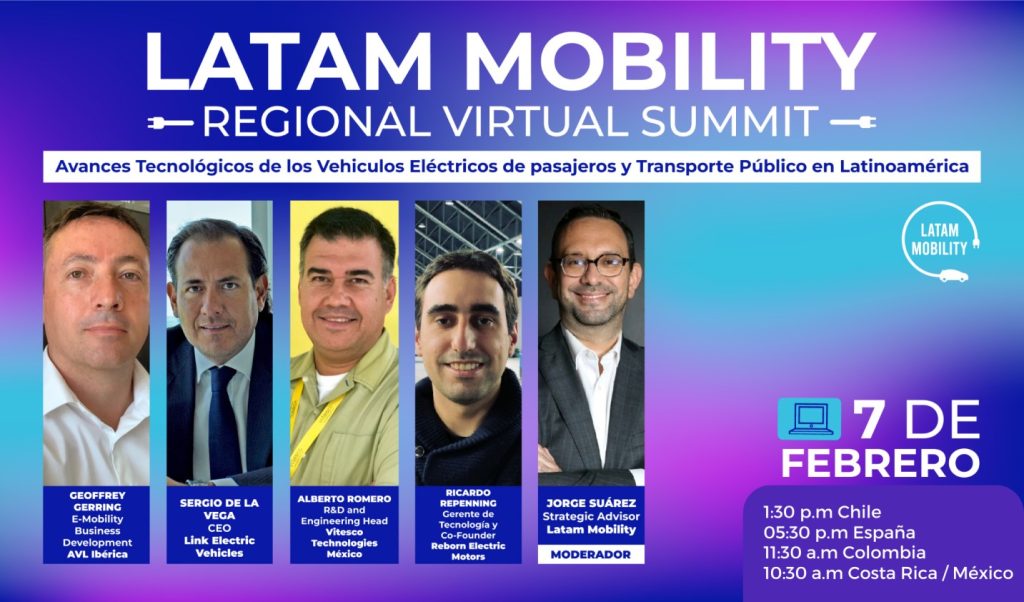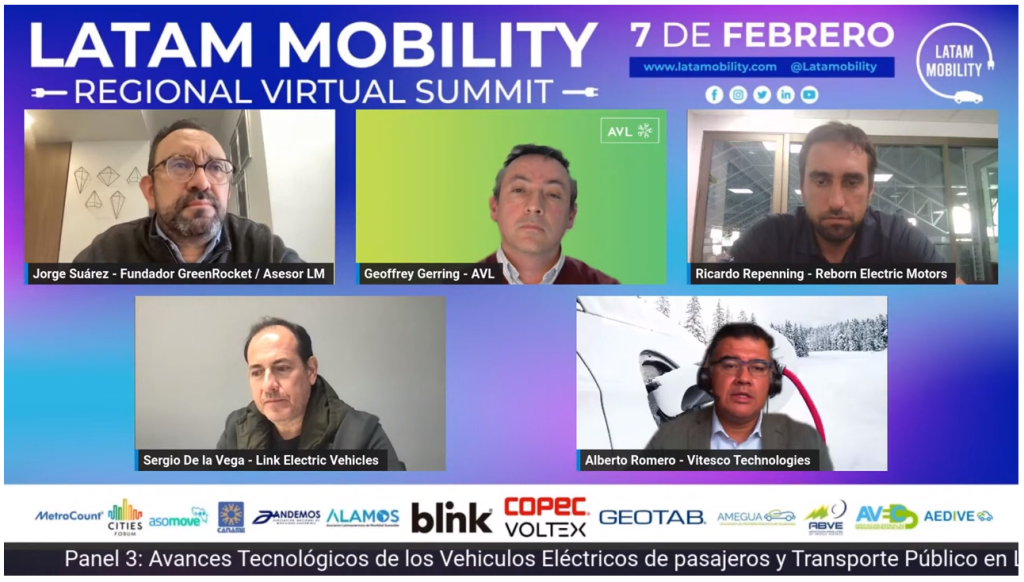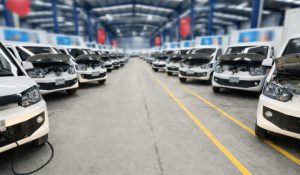
AVL, Link Electric Vehicles, Reborn Electric Motors and Vitesco Technologies Discuss Electric Vehicle Technology Advances in Latin America

The “Latam Mobility Regional Virtual Summit“, organized by the largest sustainable mobility community in Latin America, Latam Mobility, marked the beginning of the “2023 Tour” and was attended by key representatives of the public sector and private companies linked to mobility and sustainability in the region.
The virtual meeting included the panel “Technological Advances in Electric Passenger Vehicles and Public Transport in Latin America“, with the participation of Geoffrey Gerring, E-Mobility Business Development at AVL Ibérica; Sergio de La Vega, CEO of Link Electric Vehicles; Alberto Romero Hernández, R&D and Engineering Head at Vitesco Technologies Mexico, and Ricardo Repenning, Technology Manager and Co-Founder of Reborn Electric Motors, under the moderation of Jorge Suárez, Strategic Advisor of Latam Mobility.
Knowing the Technologies
Geoffrey Gerring, Head of Business Development for e-mobility at AVL, one of the world’s largest engineering and development companies for powertrain technologies with more than 70 years of experience, indicated that AVL has three business units: “The first is focused on powertrain or energy systems engineering; the second, on test benches or test technologies; and the third, on simulation or software technologies“.
Gerring pointed out that the experience is fundamental to know the new technologies that are being developed and to accompany the companies in the sector. “AVL contributes at the engineering level in each project, and offers test bench systems to support with the installation, marketing and offer such services in our facilities worldwide. As well as simulation tools and software that are practically indispensable to help in the initial phases and shorten the development process of electric vehicles”.
In relation to adaptability, the AVL executive pointed out that the company covers several segments. “We work with different companies in the sector, since we not only focus on passenger transport or vehicles, but we are in different segments, such as competition, agriculture, maritime transport, and everything that has a propulsion system. Our services range from engineering, testing means and simulation tools, which we adapt to the customer regardless of size or needs.”
You may also be interested in: Blink Charging, Vehya, Celsia and Growatt Discuss State of Charging Infrastructure Development in Latin America
New Challenge
Ricardo Repenning, Technology Manager and Co-Founder of Reborn Electric Motors de Chile, explained that his company is dedicated to the transformation of diesel buses and trucks to their electric versions at a competitive and accessible cost for developing countries, in order to accelerate the migration towards zero emission vehicles, including heavy duty use, and has a fleet of 104 vehicles operating in Teniente, the largest subway copper mine in the world.
“As a Latin American company, what we are looking for is to leverage competitive advantage. There are segments that have been covered in the Chilean market, such as the penetration of mostly Chinese buses, in the case of Trasantiago, where there are more than 800 vehicles or buses. We must be able to differentiate ourselves and be able to look for the edges that we can offer and contribute with technology, such as bodywork, axles, engine sizing, technical characteristics and other niches to take advantage of this advantage, and move towards greater volumes that will allow us to be even more competitive”.
In relation to the conversion of combustion vehicles to electric, Repenning said that there must be a regulatory accompaniment, apart from the technical changes. “For mining vehicles, we had to work with the Chilean Ministry of Transport and ECLAC, which published draft regulations on vehicle conversion processes, including the traction system, electrical safety, dimensional components and the responsibilities of the company performing the conversion. This was very necessary to be able to move forward in this market.

Less Dependence
For his part, Sergio de La Vega, CEO of Link Electric Vehicles, indicated that in 2017, his company began a transformation towards renewable energy with energy efficiency systems, and a convergence towards zero-emission mobility; it has operations in Asia, Europe and Latin America, and is involved as a group in charging solutions systems, and renewable energy.
In relation to the electric vehicle he indicated that the total cost of commercial operation is lower than a fuel-based one, but it is also very restrictive due to the lack of autonomy. “The electric vehicle offers an advantage for independent producers, because the supply chain of an internal combustion one can go up to 20,000 parts, while the electric reduces it to less than 2,000 components, which becomes an easier supply chain to run.”
“The ability to have a supply chain is giving rise to a lot of new companies and a lot of innovation. It is true that there is still a significant dependence on Asia and particularly China, the most advanced country in electric mobility, but progress has also been made to minimize Asian dependence. The world is reacting with the construction of battery mega-factories in many parts of the world, which leads us to believe that in a few years this dependence will not exist”.
You may also be interested in: “Latam Mobility Regional Virtual Summit”: Copec Voltex presents a wide range of solutions to promote electromobility
Electric and Hybrids
Alberto Romero Hernández, R&D and Engineering Head at Vitesco Technologies Mexico, explained that his company develops and manufactures powertrain technology, is established in several locations in Mexico and has an important portfolio dedicated to electric or hybrid vehicles in their different levels of hybridization.
According to the business model, Romero pointed out that Vitesco Technologies attends to different requests and doubts from various types of customers to help them solve their needs. “In our offices or development centers in Mexico and the United States, depending on where they are located, we have a team that attends to requests for information or doubts, and we work together to understand the customer’s requirement.”
In relation to Vitesco Technologies‘ vision to 2030, the executive indicated that the company joined the PoleStar project. “The company has focused on having a neutral carbon footprint throughout its value chain by 2040, and is working with other companies, institutions and different actors in the automotive sector, in an open network of collaboration, to reach a neutral vehicle, which obviously involves work beyond just the vehicle without the emissions.“





